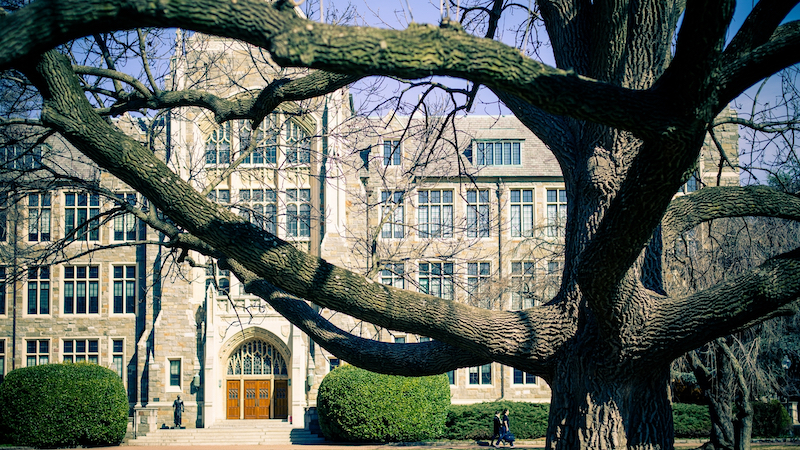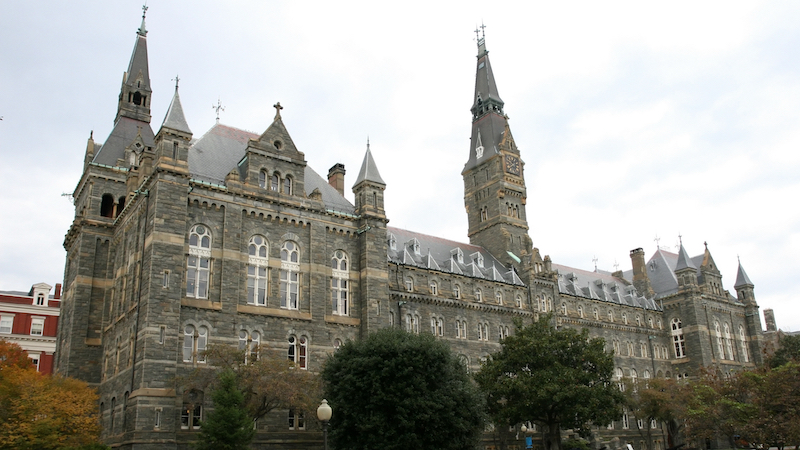The Ivy Scholars guide to Georgetown University’s culture, admissions, and other essential information for prospective students and their families.
Location: Washington, D.C.
Mascot: Jack the Bulldog
Type: Private Research Institution
Population: 19,000 (7,500 undergrads)


Year Founded: 1789
4 Year Graduation Rate: 89%
Gender Distribution: 56% female, 44% male
Acceptance Rate: 15%
Residency: 1% in state, 82% out of state, 17% international
Location Type: Urban
Schedule System: Semesters
Student/Faculty Ratio: 11:1
Average Class Size: 20
Demographics: 53% Caucasian, 9% Asian, 10% Hispanic, 6% Black, 22% Other
US News Rankings:
Independent Rankings:
Application Deadlines:
Notification Dates:
Acceptance Rates:
Average Applicant Pool: 21,000
Average Number of Applicants Accepted: 3,400
Average Number Enrolled: 1,600
Application Systems: Georgetown Application
Average GPA: 4.01 weighted
SAT Scores: 25th percentile – 1370, 75th percentile – 1530
ACT Scores: 25th percentile – 31, 75th percentile – 34
*Test mandatory. Writing sections required.
Demonstrated Interest: Georgetown does not consider demonstrated interest.
Recommendation Letter Policies: A letter or report from a counselor is required. One letter from a teacher is required. The teacher who should write the letter depends on the applicant’s desired school/major: Georgetown college: science or pre-med, math or science teacher; foreign language or linguistics, a foreign language teacher; all other majors, any teacher from a core academic subject. School of Business: math or social studies teacher. School of Nursing: science or math teacher. School of Foreign Service: teacher in a core academic subject.
Georgetown Essay Prompts:
Special Notes:
Transfer:
Admissions Criteria:
The most important factor Georgetown is looking for is academic excellence, as demonstrated by GPA, course rigor, and standardized test scores. Note that at least three SAT Subject Tests are “recommended” for students applying to Georgetown.
Other important factors are essays, letters of recommendation, extracurriculars, interview, talent, and character.
Factors which are considered are legacy status, first generation status, race/ethnicity, geographic origin, and work or volunteer experience.
Being a recruited athlete can help your admissions chances, with approximately 10% of the incoming class being designated as recruited athletes. While the school still wants to see proper academic preparation, recruitment does give a boost to admissions chances.
While the school has a Catholic affiliation, applicant’s religion has no impact on admissions decisions.
The school wants students who will impact campus and the world for the better, and those who demonstrate leadership ability in their extracurriculars or teacher recommendations are more likely to do so. In the same vein, students who are passionate about theta they are studying are more likely to make an impact in the field. The school wants students to leave a positive impact and the world, and will be drawn to those students who have already shown an ability to do so.
The school looks for passion and involvement generally in extracurriculars. While it is great if they all fall in line with your intended field of study, it is not required. What is important is that extracurriculars, and the short essay which discusses one of them, describe a student’s passion for what they are doing. A student deeply involved at a high level in a few activities will stand out more to admissions here.
Students who are descendents of the 292 slaves sold by the university in the 1800s will receive the same boost to admissions as legacy applicants.
The school is currently actively working to increase the number of low income and first-generation students on its campus, along with increasing recruitment rates for underrepresented student populations.
Georgetown Strategy
While Georgetown does practice holistic admissions, having good academic preparation is still a very important part of an application. While a few low grades or lower than average test scores can be made up for by truly stellar achievements in other areas, it isn’t good to rely on that, especially as the school’s acceptance rate is so low. Having a high GPA, taking rigorous classes, and achieving good test scores will aid your application.
The school requires all applicants complete an alumni interview, and treats this as a key component of the application. Doing poorly on this will hurt your application, and performing well will aid you. It is a good idea to practice once or twice before attending. Be ready to answer questions about why you like Georgetown specifically, and what field you want to study. Don’t be overly scripted in your response, nor should you only say what you think interviewers want to hear. The interview is a chance for the school to better know you as a person and applicant, and you should take full advantage of that.
Your character will be an important part of your application, and the essays are the best place to show this. While Georgetown does not require students to be Catholic, they do base their values on their Jesuit culture, and look for complementary values in students. While you don’t need to swear undying loyalty to the pope, they are looking for compassion, leadership, and a desire to make the world a better place. Demonstrating these traits in your essays will show the school that you fit in with the culture they are trying to nurture.
For extracurriculars, what they are looking for specifically will change each year, as they try to ensure a diverse and well-rounded community overall. That said, they will always seek passionate and involved students, who are dedicated to and specialize in one extracurricular activity, and excel in their chosen field.
Students should consider which of the schools they are best suited for when applying to Georgetown, as admissions decisions are made by school, and changing between them is difficult.
Students should be aware of the culture at Georgetown, and ok with it before they decide to attend. While students are not required to be Catholic, or indeed show any religious affiliation, the school is still associated with the Catholic faith, and the Jesuits in particular. While this manifests differently from Notre Dame, it does still impact campus culture.
Schools:
Courses of Study:

AP Credit Policies:
Honors Programs:
Research Availability:
Study Abroad:
Pre-Med Options:
Computer Science Options:
Additional Specialty Programs:
Programs for High Schoolers:

School Motto: Both in One
Mission and Values:
House System:
There are 13 residence halls on campus, 4 of which are set aside for first years. Residences generally are divided into halls, which are traditional dorms, and villages, which feature apartment-style accommodations. While upperclassmen are not required to live in campus housing, many do for the entirety of their stay at Georgetown.
Housing Statistics:
Campus & Surrounding Area:
Transportation:
Traditions:
Student-Run Organizations:
Sports:
Nightlife:

Yearly Cost of Attendance:
Financial Aid:
More than half of students receive some form of financial aid. A student’s ability to pay is based on their family income which must be reported in the Free Application for Federal Student Aid (FAFSA). All students are required to make a minimum contribution, regardless of financial need. Most financial aid awards include work-study and loans as part of the award.
Additional Financial Aid & Student Loan Information
Scholarships:
Students are automatically considered for a number of need-based scholarships when they apply. Georgetown is committed to meeting all demonstrated financial need of its students. They have also collected a list of outside scholarships which students are encouraged to apply to.

Ivy Scholars is the leading educational consultant in Sugar Land, Texas, providing admissions coaching, test prep, and more to help students enroll at top tier schools.

Call us now: +1 (281) 215-5148
.
Get expert tips, admissions updates, and resources delivered straight to your inbox.


